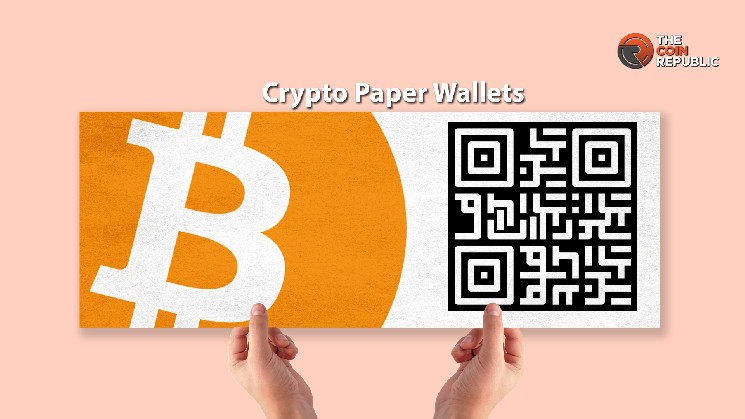Crypto Paper Wallets: What are They and How to Use Them?

Most users are familiar only with hardware and mobile wallets. Very few people know about crypto paper wallets. Let’s explore what crypto paper wallets are, how they work, and their pros and cons.
Understanding Crypto Paper Wallet
A crypto paper wallet is a physical paper holding an online wallet’s personal and public keys. It makes holding cryptocurrencies offline possible as it contains cryptographic keys in the form of an alphanumeric string or QR code.
These wallets came into existence in the early 2010s and witnessed a sudden surge in fame by the mid-2010s. As an offline wallet, these paper wallets had no threat of online hacks. They provided complete control to users over their private keys.
Crypto paper wallets witnessed their downfall around 2016 due to their vulnerability to physical damage and lack of a seed phrase to recover money if the paper is lost.
How Do Crypto Paper Wallets Operate?
Let’s take a look at how Crypto paper wallets operate:
Generation
To generate a paper wallet, select a trustable paper wallet generator. The generator should be offline; it will minimize the risk of potential hacks. Make sure to install antivirus software on the generator.
Note down the wallet details
After generating the wallet, it is time to print or write down its information. Once you print the information, the keys are removed from your digital wallet. Keep your printed details safe, and don’t lose them.
Safeguard the Storage
Securing the printed information is necessary. You can make multiple copies and store them in distinct, secure physical locations to protect the information.
Fund your Wallet
Make a crypto purchase from a reliable exchange and transfer it to a public address on a paper wallet. Paper wallets offer you a way to store and access cryptocurrencies offline.
Access the fund
You can use the private key to transfer or sweep your funds within a digital wallet to access your funds.
Advantages of Paper Wallets
Here are some of the advantages of the paper wallets:
The Leverage of Offline Storage
These paper wallets work as cold wallets. Most of these wallets are generated offline, which removes the threat of online attacks by hackers.
Cost-Effective
Paper wallets are the most cost-effective option among the other options for storing private keys. These wallets do not charge setup fees, monthly subscriptions, or other charges.
Complete User Control Over private keys
Paper wallets offer their users complete autonomy over their private keys. The control provided by these self-custody wallets removes the dependency on intermediaries and improves security. Users can get their hands on their digital assets without giving personal information or any kind of KYC.
Disadvantages of Crypto Paper Wallets
The following are some of the disadvantages of these paper wallets:
The threat of physical damage
A Paper wallet is a piece of paper vulnerable to physical damage. Papers are known to be fragile, and any damage to the paper wallet can permanently cause you to lose your digital assets.
Loss or Theft
Paper wallets can easily be lost or stolen. These wallets are usually small and lightweight, making the threat more real.
Unauthorized Access
The biggest disadvantage of a crypto paper wallet is unauthorized access. You can’t track who is accessing the wallet, the actual owner, or some thief.





 Bitcoin
Bitcoin  Ethereum
Ethereum  Tether
Tether  USDC
USDC  Dogecoin
Dogecoin  Cardano
Cardano  TRON
TRON  Chainlink
Chainlink  Bitcoin Cash
Bitcoin Cash  LEO Token
LEO Token  Litecoin
Litecoin  Dai
Dai  Stellar
Stellar  Monero
Monero  Ethereum Classic
Ethereum Classic  Stacks
Stacks  Cronos
Cronos  OKB
OKB  Hedera
Hedera  Cosmos Hub
Cosmos Hub  Maker
Maker  KuCoin
KuCoin  Theta Network
Theta Network  Gate
Gate  Algorand
Algorand  Polygon
Polygon  NEO
NEO  EOS
EOS  Tether Gold
Tether Gold  Tezos
Tezos  Zcash
Zcash  TrueUSD
TrueUSD  Synthetix Network
Synthetix Network  IOTA
IOTA  Bitcoin Gold
Bitcoin Gold  Holo
Holo  Dash
Dash  0x Protocol
0x Protocol  Zilliqa
Zilliqa  Siacoin
Siacoin  Enjin Coin
Enjin Coin  Ravencoin
Ravencoin  Basic Attention
Basic Attention  Qtum
Qtum  Decred
Decred  Ontology
Ontology  NEM
NEM  Lisk
Lisk  Nano
Nano  Numeraire
Numeraire  Pax Dollar
Pax Dollar  DigiByte
DigiByte  Waves
Waves  Status
Status  Huobi
Huobi  Hive
Hive  Steem
Steem  BUSD
BUSD  Ren
Ren  OMG Network
OMG Network  Bitcoin Diamond
Bitcoin Diamond  Bytom
Bytom  Kyber Network Crystal Legacy
Kyber Network Crystal Legacy  HUSD
HUSD